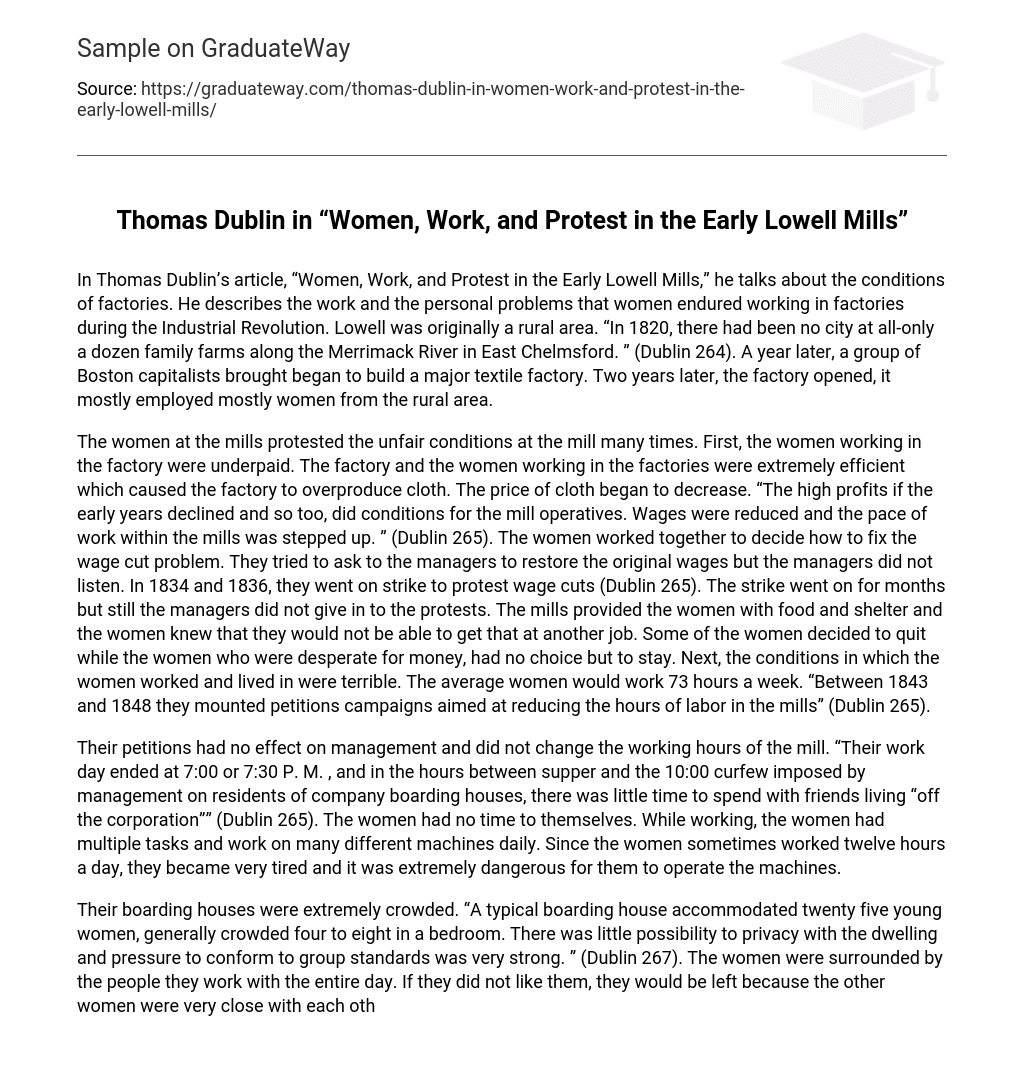In Thomas Dublin’s article, “Women, Work, and Protest in the Early Lowell Mills,” he talks about the conditions of factories. He describes the work and the personal problems that women endured working in factories during the Industrial Revolution. Lowell was originally a rural area. “In 1820, there had been no city at all-only a dozen family farms along the Merrimack River in East Chelmsford. ” (Dublin 264). A year later, a group of Boston capitalists brought began to build a major textile factory. Two years later, the factory opened, it mostly employed mostly women from the rural area.
The women at the mills protested the unfair conditions at the mill many times. First, the women working in the factory were underpaid. The factory and the women working in the factories were extremely efficient which caused the factory to overproduce cloth. The price of cloth began to decrease. “The high profits if the early years declined and so too, did conditions for the mill operatives. Wages were reduced and the pace of work within the mills was stepped up. ” (Dublin 265). The women worked together to decide how to fix the wage cut problem. They tried to ask to the managers to restore the original wages but the managers did not listen. In 1834 and 1836, they went on strike to protest wage cuts (Dublin 265). The strike went on for months but still the managers did not give in to the protests. The mills provided the women with food and shelter and the women knew that they would not be able to get that at another job. Some of the women decided to quit while the women who were desperate for money, had no choice but to stay. Next, the conditions in which the women worked and lived in were terrible. The average women would work 73 hours a week. “Between 1843 and 1848 they mounted petitions campaigns aimed at reducing the hours of labor in the mills” (Dublin 265).
Their petitions had no effect on management and did not change the working hours of the mill. “Their work day ended at 7:00 or 7:30 P. M. , and in the hours between supper and the 10:00 curfew imposed by management on residents of company boarding houses, there was little time to spend with friends living “off the corporation”” (Dublin 265). The women had no time to themselves. While working, the women had multiple tasks and work on many different machines daily. Since the women sometimes worked twelve hours a day, they became very tired and it was extremely dangerous for them to operate the machines.
Their boarding houses were extremely crowded. “A typical boarding house accommodated twenty five young women, generally crowded four to eight in a bedroom. There was little possibility to privacy with the dwelling and pressure to conform to group standards was very strong. ” (Dublin 267). The women were surrounded by the people they work with the entire day. If they did not like them, they would be left because the other women were very close with each other. Lastly, the women became very close to each other. They were with each other the entire day.
They faced similar problems and they worked together to find a solution to them. When the women protested the lower wages and working too many hours at the mill, the women worked together to convince management to change their mind and to organize the strikes. Without the women becoming friends, the protests would never have happened. “The existence of community among women, in turn, was an important element in the repeated labor protests of the period…” (Dublin 265). When a woman would need some time off for an illness or to enjoy themselves, the other women would do extra work so the woman on break would still get paid.





